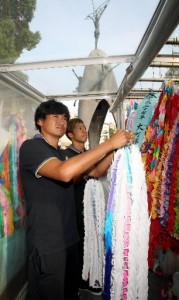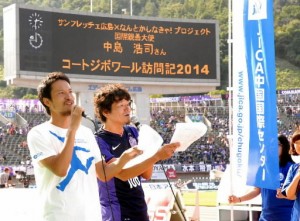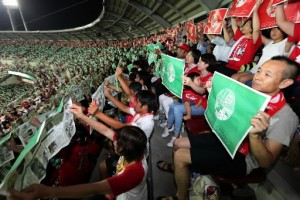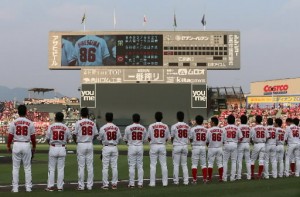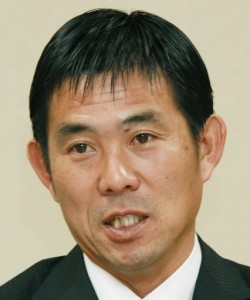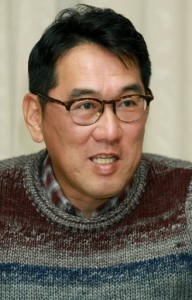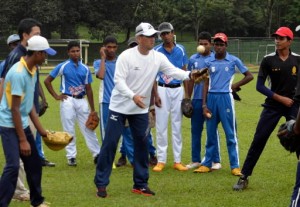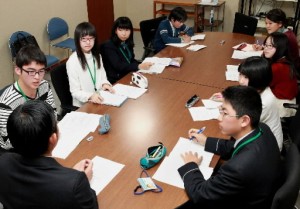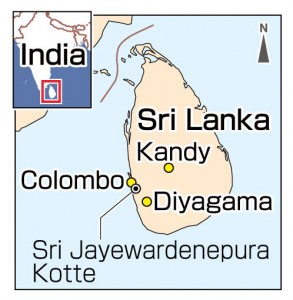Peace Seeds: Teens in Hiroshima Sow Seeds of Peace (Part 27)
Feb. 11, 2016
Part 27: Professional sports teams in Hiroshima, a city of peace
In the quest to create a peaceful world, there are many people putting their thoughts into words and taking concrete action. Messages of peace that are conveyed through sports can draw a great deal of attention and are particularly appealing and effective. Hiroshima’s leading professional sports teams, the soccer team Sanfrecce Hiroshima and the baseball team the Hiroshima Toyo Carp, also promote peace through the words of their coaches and the international aid they extend.
For this article the junior writers spoke with Hajime Moriyasu, 47, the head coach of Sanfrecce Hiroshima and Kenjiro Nomura, 49, the former manager of the Hiroshima Carp, to learn their perspectives.
Mr. Moriyasu grew up in Nagasaki through high school and joined the Mazda Soccer Club (now Sanfrecce Hiroshima) in Hiroshima. To date, he has spent most of his life in the two A-bombed cities. It is remarkable that his team has won the J1 League championship three times in the four years he has been the head coach, but we are also drawn to him personally. We have seen how he refers to Hiroshima as “a city of peace” during soccer games, such as last season’s J League Championship and the Club World Cup.
Last summer Mr. Nomura visited Sri Lanka, where reconstruction efforts are being made in the wake of that nation’s civil war, as part of a project organized by the Japan International Cooperation Agency (JICA) and the Hiroshima Carp. He said he felt a positive response from the people there when engaging in baseball clinics for children and conveying the importance of creating a peaceful world and making friends through baseball.
Hajime Moriyasu, head coach of Sanfrecce Hiroshima, talks up Hiroshima as a city of peace
Mr. Moriyasu told us, “A lot of people hope that nuclear weapons will be abolished. Because Sanfrecce is based in Hiroshima, an A-bombed city, I hope to appeal for peace from here.”
He said that it was natural for him to begin thinking about peace issues while living in Nagasaki and Hiroshima. At 8:15 a.m. on August 6 and 11:02 a.m. on August 9, the times these two cities were attacked with atomic bombs, he pauses to offer a silent prayer to the A-bomb victims.
On days when Sanfrecce plays a game in Hiroshima, Mr. Moriyasu follows a special routine each morning. He takes a walk from his hotel to the bank of the Motoyasu River and prays toward the Hiroshima Peace Memorial Park in Naka Ward. “Those who became victims of the war and the atomic bombing have led us into the future,” he said. “I appreciate the fact that I’ve been able to make soccer, which I love, my life’s work.” His regular strolls by the river enable him to stay mindful in his daily life and composed for his games as the Sanfrecce coach.
Positive response from the world
All of the games in last December’s Club World Cup were broadcast in about 180 nations. Mr. Moriyasu said, “I felt again that people across the world are aware of Hiroshima and the power of soccer to convey messages of peace.”
One of the Club World Cup participants from South America told him, “After this is over, I’ll invite my family to come to Japan and we’ll go sightseeing together. First, we’ll go to the Peace Memorial Park.” Many of the supporters of Club Atlético River Plate, the team from Argentina which faced Sanfrecce in the semifinals, visited Hiroshima before or after the game.
“Sports can connect people beyond political systems and squabbles,” Mr. Moriyasu said. “In the Club World Cup, I felt strongly that Sanfrecce could play a role in conveying the idea of ‘Hiroshima as a city of peace’ to people all over the world.” This way of thinking leads to his proactive appeals.
A team in Hiroshima
Mr. Moriyasu sees a link between Sanfrecce’s playing style and Hiroshima’s reconstruction. “The people of Hiroshima worked hard to rebuild the city after it was devastated by the atomic bombing,” he said. “We want to continue playing our games that way, as a team in Hiroshima, with resilience and tenacity.” He demands that his players give their best effort until the very end of each game, explaining, “We can’t control the outcome of the game, whether we’ll win or lose, but we can keep playing hard until it’s over. I want people to see that determination when we play.”
Kenjiro Nomura, former manager of the Hiroshima Carp, promotes baseball and peace in Sri Lanka
Last July, Kenjiro Nomura, the former manager of the Hiroshima Carp, visited Sri Lanka with staff members from JICA and the Carp team and taught baseball to children there.
“I was really touched by the children’s smiles and their enthusiasm,” Mr. Nomura said. “I’m happy I went to Sri Lanka.” Despite a downpour, the children continued to play baseball with happy faces. It seems their smiles were a reflection of what Mr. Nomura always says, that “Playing baseball is fun.”
Mr. Nomura taught these baseball clinics with the hope that the pleasure of playing baseball could enable the children to feel the preciousness of peace and help them recover from that nation’s civil war. Hiroshima, which was able to rebuild from the devastation of the atomic bombing, is a shining example for countries that have suffered from conflict. “We couldn’t speak each other’s language,” Mr. Nomura said, “but I think my message moved their hearts.”
Link between Sri Lanka and Hiroshima
In Colombo, Mr. Nomura and the others visited a memorial for the members of a baseball team of a combined elementary school and junior high school who were killed in a terrorist suicide bombing in 2008. The countless holes in the metal baseball bats embedded in the monument convey the tragic incident. Mr. Nomura noted the resemblance to the Hiroshima bombing in that civilians were killed indiscriminately.
“Just as the Hiroshima Carp encouraged the people who were making efforts to reconstruct the city after the atomic bombing, I hope that baseball will give strong hope to the people of Sri Lanka,” Mr. Nomura said. “I hope they’ll feel happy working together to accomplish their goals.” He also believes that future leaders for advancing peace will emerge as a result of learning about the importance of cooperation through playing sports.
Importance of making diligent efforts
Both Mr. Moriyasu and Mr. Nomura have reflected on peace in connection with Hiroshima and put their feelings into words and action, which has enabled many others to think about peace, too. We believe they have played an important role in promoting peace.
Mr. Moriyasu said, “It isn’t easy to continue doing our best, but this is how we produce special results.” For Mr. Moriyasu, these special results include winning championships with his soccer team. This principle also applies to many other things in life, like our performance at school.
Mr. Nomura also stressed the importance of making efforts to achieve the goals we set.
Both men view diligent efforts as vital to success. Such efforts are essential, as well, for creating a world that is free of nuclear dangers, poverty, conflict, and terrorism. We hope these special results will be realized by doing our best, each one of us, to continue making efforts for peace.
Ishin Nakahara, 17, Maiko Hanaoka, 17, Kohei Furohashi, 16, Nanaho Yamamoto, 16, Miyu Okada, 15, Anna Primus, 14, Ai Mizoue, 13, Miki Meguro, 12, and Atsuhito Ito, 12, contributed to this article.
Keywords
Sri Lanka
Sri Lanka is an island nation in the Indian Ocean. It is about 66,000 square kilometers, around four-fifths the size of Hokkaido, and has a population of about 20 million people. In 1983, a civil war broke out between government forces and an armed Tamil group over the preferential treatment given by the government to Sinhalese citizens. This civil war persisted intermittently until 2009 and resulted in the loss of more than 80,000 lives.
Baseball instruction in Sri Lanka
The Japan International Cooperation Agency (JICA) has sent Japan Overseas Cooperation Volunteers to Sri Lanka since 2002 to offer baseball instruction to the local people as part of its support for the reconstruction efforts being made there. The first baseball stadium in South Asia was completed in Diyagama in 2012 with Japan’s support. JICA’s Chugoku International Center and the Hiroshima Toyo Carp provided baseball equipment last year. Mr. Nomura, the former baseball manager, visited Sri Lanka and held baseball clinics for children three times in Kandy and other locations. They plan to provide additional equipment, too.
Junior writers’ impressions
Before we interviewed Hajime Moriyasu, the head coach of Sanfrecce Hiroshima, and Kenjiro Nomura, the former manager of the Hiroshima Carp, I didn’t link sports to peace. But after listening to their stories, I realized that sports can play an important role in bringing people together. These connections between people create mutual trust, which leads to peace. In particular, Mr. Nomura talked about forming relationships where people can tell one another when they do something wrong. I think I need more friendships like that. (Nanaho Yamamoto)
I wondered how sports could connect to peace. Through these interviews, I learned that sports can connect people all over the world, beyond national borders, and convey the importance of peace. Mr. Moriyasu said that he lives with appreciation for the people who lost their lives in the war and have enabled him to lead a happy life. As a native of Hiroshima, I respect him and I’m proud that Mr. Moriyasu is the head coach of Hiroshima’s soccer team, since his thoughts are aligned with this city of peace. He inspired me and I’d like to follow his example. (Anna Primus)
I had the chance to interview Mr. Moriyasu and Mr. Nomura, and they seemed so big. They have strong feelings about peace, and I felt they were “big” human beings. I did my best to write an accurate article about two men who are conveying their thoughts about Hiroshima to the people of the world. As a student, I want to follow the example they set in their thinking and their way of living. Both of them told us that we can achieve good results by making persistent efforts, which also means that we can’t accomplish our aims if we don’t make these efforts. With their messages in mind, I plan to continue doing my best. (Ishin Nakahara)
Mr. Moriyasu and his team have helped raise awareness of Hiroshima in about 180 nations through international soccer games, including the Club World Cup. It may be difficult for us to connect with a lot of people at one time, like sports figures such as Mr. Moriyasu. But I think we can come to understand one another by talking to people in other countries via Skype or meeting them for conversation. I want to gradually deepen my understanding of people from different cultures, making the most of my opportunities. (Atsuhito Ito)
Unfortunately, I wasn’t able to take part in the interviews, but I heard about them from the other junior writers who were there. I was impressed by Mr. Moriyasu’s routine. When he has a game in Hiroshima, he takes a walk by the Motoyasu River in the morning and offers a prayer toward the Hiroshima Peace Memorial Park. His actions are touching to me because he’s thinking about peace. It had seemed to me that sports didn’t have anything to do with peace, but I felt that these thoughts about peace were one of the factors that contributed to the team winning the championship. Mr. Moriyasu is originally from Nagasaki and now lives in Hiroshima. I thought that I should be thinking about peace because I live in the A-bombed city of Hiroshima. If there’s another chance like this, I’d love to be involved in the interviews. (Ai Mizoue)
I agree with what Mr. Nomura said, that “People all over Japan should think about peace, at least on August 6.” Though I’m serving as a junior writer, it’s hard for me to think about peace every day. Yet on August 6, many people in Hiroshima reflect on the preciousness of peace and feel that war must never be waged again. But I’ve also heard that there are a lot of people who don’t know what happened on August 6 and I’m sorry that’s the case. I want many more people to take an interest in peace and the atomic bombing. (Miki Meguro)
Through these interviews, I learned about the relationship between sports and peace. I felt that soccer is a real symbol of peace because it’s played beyond national borders and politics and economics. Soccer players from different nations play on the same soccer field though they don’t understand each other’s language. I think this symbolizes peace. (Miyu Okada)
I was excited to interview two sports figures who represent Hiroshima and Japan. I was unusually nervous. Both Mr. Moriyasu and Mr. Nomura told us that they’re grateful they can take part in sports. I felt that it’s important to appreciate my daily life, not take it for granted. I’ve decided to become a student and an adult who won’t forget these feelings of gratitude in the future. (Kohei Furohashi)
What is Peace Seeds?
Peace Seeds are the seeds of smiles which can be spread around the world by thinking about peace and the preciousness of life from various viewpoints. To fill this world with flowering smiles, 44 junior writers, from the sixth grade of elementary school to the fifth year of high school, choose themes, gather information, and write articles.
(Originally published on February 11, 2016)

